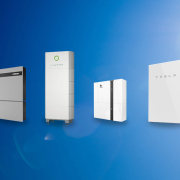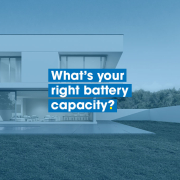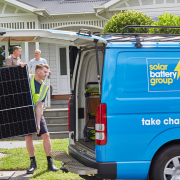How Solar Power And Solar Batteries Can Help You Save Money on Your Energy Bills
In today’s world, saving money on energy bills has become increasingly important. Harnessing the sun’s power through solar panels and batteries offers a promising solution. In this article, we will explore how solar power works, its benefits, the installation process, calculating potential savings, the role of solar batteries in saving energy, and environmental advantages.
How Solar Power Works
Solar power relies on solar panels containing photovoltaic cells capable of converting sunlight into electricity. These cells absorb photons from the sun’s rays, generating a flow of electricity. This direct current (DC) is then converted into alternating current (AC) through an inverter, making it compatible with household appliances and the electrical grid.
Benefits of Solar Power
Switching to solar power offers several compelling advantages:
- It significantly reduces electricity costs. By generating your electricity, you can minimise reliance on the grid, resulting in substantial savings over time.
- Solar power is a renewable and sustainable energy source, unlike traditional fossil fuels, which are finite and contribute to environmental pollution.
- Governments and utility companies often provide tax incentives and rebates to promote the adoption of solar power.
- Installing solar panels can increase the value of your property, making it a worthwhile long-term investment.
Installing Solar Panels
Before installing solar panels, evaluating the feasibility of solar power for your property is essential. Factors such as geographical location, available sunlight, shading, and roof orientation must be considered. Once deemed feasible, selecting the right solar panel system is crucial.
Consulting with professionals ensures an accurate assessment of your energy needs and the installation of an optimal system tailored to your requirements. In addition, proper installation by experienced technicians guarantees the efficiency and longevity of your solar power system.
Calculating Potential Savings
Determining the potential savings from solar power involves considering various factors. These include the size of your solar panel system, local electricity rates, available sunlight, and any applicable net metering or feed-in tariffs. In addition, estimating the payback period, which is the time it takes for the savings to cover the initial investment, helps gauge the financial viability of solar power. Furthermore, analysing long-term savings allows you to understand the substantial economic benefits of solar power over an extended period.
This maximises self-consumption and minimises reliance on the grid.
Other Ways to Save with Solar Power
Apart from reducing or eliminating your electricity bills, solar power offers additional ways to save. Solar batteries allow you to store excess electricity generated during the day for use at night or during periods of low sunlight. This maximises self-consumption and minimises reliance on the grid. Additionally, net metering enables you to sell excess electricity back to the grid, further offsetting costs. Finally, off-grid solar systems provide a reliable and sustainable energy solution for those seeking independence from the grid.
Environmental Benefits
In addition to financial advantages, solar power significantly contributes to a cleaner environment. By reducing reliance on fossil fuels, solar power helps decrease carbon emissions, mitigating the effects of climate change. The abundant sunlight available makes solar power a viable option worldwide, lessening dependence on limited and environmentally damaging resources. Embracing solar power empowers individuals and communities to take an active role in protecting the planet.
Common Myths about Solar Power
Several misconceptions surround solar power:
- Contrary to popular belief, solar power is not prohibitively expensive. The costs associated with solar panels have decreased significantly in recent years, making them increasingly affordable.
- Solar panels require minimal maintenance, typically limited to occasional cleaning.
- Solar power is adequate even in less sunny climates since panels can generate electricity from diffused sunlight, although they may produce slightly less energy.
In conclusion, harnessing the power of solar panels and batteries provides a viable solution for saving money on energy bills. Significant savings can be achieved over time by reducing reliance on the grid and taking advantage of renewable energy. Installing solar panels, calculating potential savings, and utilising solar batteries for energy storage are effective ways to optimise self-consumption and further minimise costs. Embracing solar power and solar batteries benefits your finances and contributes to a cleaner and more sustainable future.

 Solar Battery Group
Solar Battery Group
 Solar Battery Group
Solar Battery Group Solar Battery Group
Solar Battery Group Solar Battery Group
Solar Battery Group Solar Battery Group
Solar Battery Group Solar Battery Group
Solar Battery Group Solar Battery Group
Solar Battery Group Solar Battery Group
Solar Battery Group Solar Battery Group
Solar Battery Group


 Solar Battery Group
Solar Battery Group Solar Battery Group
Solar Battery Group